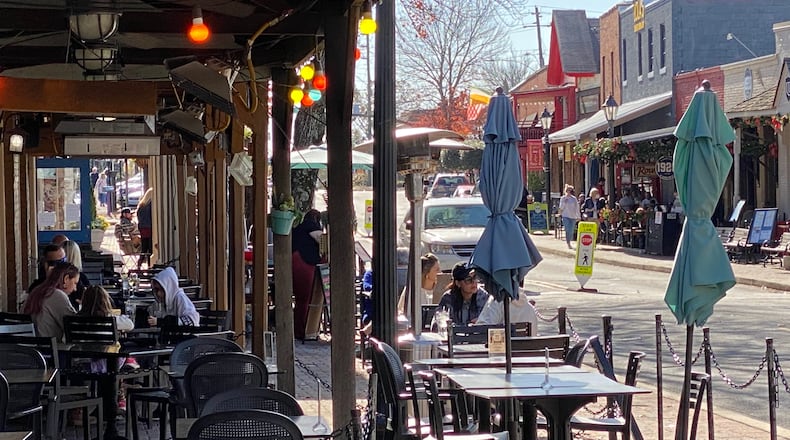Restaurant owners across metro Atlanta say their businesses are weathering the coronavirus pandemic by the slimmest of margins. Sales are down while rents and utility bills pile up. Owners say they’re waiting and hoping for assistance from their local cities.
After closing her two restaurants in Decatur and Kennesaw, Maryam Aytac says a third location in Alpharetta in north Fulton County is barely hanging on. Aytac, co-owner of Café Istanbul with husband Kemal, said they opened the first location in Decatur 25 years ago.
“Until about a month ago I didn’t know if I would have to close the doors,” Aytac said. “I’m waiting for Alpharetta to announce grants for small businesses. I’m clinging on to hope that we can make it to May. I’ve made it through worse and hoping I can keep going.”
Several cities are providing grant programs or loosening local restrictions to help restaurants like Aytac’s stay in business. Some are using coronavirus relief funds as small business grants to help restaurant owners meet expenses.
But even with financial help, winter weather is sending another chill through the restaurant business. The cold is making outdoor patios and tables less attractive to diners — and surging coronavirus cases leave some reluctant to eat inside.
Johns Creek City Councilman Brian Weaver visited several restaurants in that north Fulton County city recently to see how they were faring and to encourage owners to ask the city for support.
“I wanted to let them know that the city supports them,” Weaver said. “They’re part of the fabric of the community. This (pandemic) is something you can’t plan for. You don’t see it coming.”
Relief for restaurants
In some cities, Coronavirus Aid, Relief and Economic Security (CARES) Act money passed down from the federal government is being offered to restaurants.
In DeKalb County, restaurant owners in Decatur, Dunwoody and Tucker are eligible to apply for small business and nonprofit grants, which their respective cities are funding with CARES Act money. Dunwoody has gone a step further and implemented an al fresco grant matching program to help its restaurants expand their outdoor eating options.
Restaurants that need space heaters, tents, exterior lighting and other resources to keep diners comfortable can take part in the program and Dunwoody would potentially match 50% of their expansion costs or as much as $5,000 using CARES Act funds.
Brookhaven estimates about 20% of its bars and restaurants have permanently closed since March. The north DeKalb city is dipping into its reserve fund to help. Any eligible business in the city that renewed their alcohol license by the end of November could receive up to a $5,000 grant to spend on other operations.
Alan Goodman, president of the Brookhaven Chamber of Commerce, said the city values and recognizes restaurants as employers of a large number of people.
In north Fulton, Johns Creek and Sandy Springs are also offering grants funded by the CARES Act to small business owners including restaurants. Depending on the number of employees, a Sandy Springs restaurant owner could receive $5,000 to $15,000 through a small business relief grant.
Eligible businesses in Johns Creek could receive as much as $10,000. But, because each business will receive an equal share of grant funds, the amount will likely be lower, city spokesman Bob Mullen said.
Restaurant owners say amounts large and small would make a difference. Thomas Taylor, co-owner of Trattoria One 41 and other restaurateurs took Weaver’s advice and asked the City Council for help before the grant initiative was approved at a Nov. 16 meeting.
Taylor said even $6,000 to cover a rent payment would be a substantial help. “That’s big when it’s not COVID,” he said. “During COVID, that’s a triple Christmas.”
Sugo restaurant owner Fred Castellucci told council members of his struggles to cover $48,000 in operating costs during the pandemic, which includes nearly $16,000 in rent and utilities. None of his 34 employees have been laid off, Castellucci said. Both restaurant owners are eligible to apply for the city’s grants.
Strategies for survival
Besides grants, cities have employed other strategies to help restaurants bring in more income. Loosening restrictions on alcohol sales and clearing the way for more outdoor seating are two tactics intended to bolster the bottom line for restaurants.
Roswell and Sandy Springs passed laws to allow home delivery of alcohol by restaurants. Roswell had already allowed restaurant bar patrons to carry open containers from one place to another in districts such as the downtown Canton Street.
Last month, in anticipation of the delivery ordinance, Dana Gurela, owner of Deep Roots Wine Market and Tasting Room, said home delivery would be an added tool for the business.
“That’s the lovely thing about Roswell,” she said. “They are very progressive with their alcohol laws.”
Sidewalk tables are a mainstay in some downtowns and cities are working with restaurants to offer more fresh-air seating.
Alpharetta is allowing restaurants to use sidewalk space to set up tents for outdoor dining. While some restaurants already have outdoor dining built into their operations model, Assistant City Administrator James Drinkard said the new measure will especially help smaller establishments that don’t have outdoor space.
Ryan Pernice owns Table & Main and Osteria Mattone in Roswell, as well as Coalition Food and Beverage in Alpharetta. He is working to meet a short list of requirements to get the city to approve a “yurt” — a heavy, round tent — for dining outside Osteria and Mattone. Pernice said that if he could book reservations for the yurt as a private dining room at least three times per week, the restaurant would survive through the winter.
Bucking the trend, Roswell officials clamped down on some restaurants and the amount of space allowed for sidewalk dining. Last month, the city discontinued live jazz music showcased on the patio of Canton St. Social.
Councilman Matt Judy, who disagreed with those actions told The Atlanta Journal-Constitution that it’s important to help local restaurants in any way possible.
Pernice said restaurants try to stay busy every day of the week in order to be profitable.
“Behind the scenes, things are very much in play,” Pernice said of restaurants. “Everyday you’re dealt a different hand. A huge swath of the population has yet to return to restaurants.”
Keep Reading
The Latest
Featured



